Fiction
Nonfiction
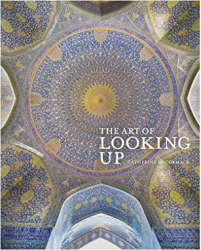
This book is about famous and not so famous ceiling art around the world and it has beautiful pictures and some awesome explanations about how the art lands into one of four categories: Politics, Religion, Culture, and Power. It is a really great book!!!
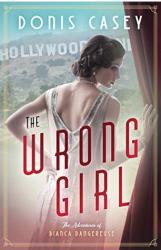
This is a book well worth reading as it has all the mystery and glamor and humor a good mystery should have and it has people who help and show compassion for the girl in the story! It is also a story written with the correct facts of the era in which this story plays. I have read the other Donis Casey books and love how this one has come about. Its a follow up of Donis's other series. Can't wait to read the next one!!
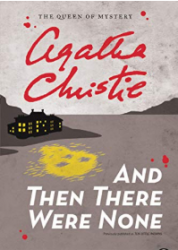
A stand alone mystery from the great Agatha Christie. This mystery is
inspired by an Olde English nursery rhyme about ten little soldiers. Reading
the poem can give clues as to what is happening and what happens next but the
mystery is bamboozling and enthralling the whole way through. It is a
complicated psychological thriller that takes an epilogue to understand.
Thrilling from start to finish.
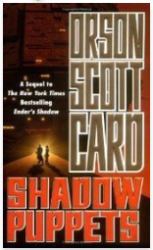
It’s odd for me to read the third book in a series and be confronted with
problems that I usually see by the fourth book. So far, I’ve been on board
with the whole Shadow series as it focuses on an interesting character in the
form of Bean. For two books, I’ve read about Bean’s survival, made all
the more thrilling by the antagonist Achilles. Of course, during Ender’s
Shadow and Shadow of the Hegemon , the series picked up plenty of side
stories and sub-plots. This is what ruined Shadow Puppets for me: the focus
wasn’t on Bean and Achilles, but rather on advancing the story of all these
sub-plots.
Now, don’t get me wrong, Shadow Puppets has a lot of interesting events.
It’s just that it was so entertaining to read about Achilles in the
previous books, and he’s relegated to a bookending motif for this book. We
don’t get to see him directly interact with others, instead of having the
main characters always wondering how he’ll react to their attempts to trap
him. This kind of “telling” instead of “showing” really rubbed me the
wrong way and made the climax of this story (let alone the first three books)
feel quite anticlimactic.
I do appreciate some of what Card does with these well-rounded characters,
and I want to see what happens next with a world in such turmoil and
turnover. And yet, with how unfocused this book was, I don’t know if I want
to get my hopes up for the next books in this series. After all, the central
conflict of the previous two books is now behind Bean, which makes me wonder
what could replace such a heart-pounding game of cat-and-mouse. There are
plot threads to follow into the next book, but I could probably predict what
happens just based on the foreshadowing contained in this book.
An unfocused and slightly anticlimactic conclusion to one of the best
antagonists, I give Shadow Puppets 3.0 stars out of 5.

I’ll admit that reading The Fifth Season had a bit of a learning curve for
the Broken Earth series. Not only did I have to learn about the vastly
powerful magic system based on rocks (and other rock forms), but I had to get
used to a second-person point of view (POV). Jumping between timelines with
similar characters who had different names was a bit confusing, but I was
able to figure it out by the end. Fast forward to the sequel, The Obelisk
Gate, and most of my qualms with the first book were smoothed over or solved
outright.
One of the things I enjoyed about The Obelisk Gate was the increase in the
scale of the magic system. Including the moon in these calculations makes
perfect sense considering the nature of the orogeny magic. I also appreciated
how the story seemed to focus on a single POV, which made for a more intimate
experience as we followed only one or two individuals instead of four. Now
that I was used to the second-person writing style and the character it
described, it didn’t bother me as much as when I read The Fifth Season.
While The Fifth Season set up the world-building for this trilogy, The
Obelisk Gate’s only weakness is that it finally set up the climactic plot
for the third book. Sure, there was plenty of character development and
intriguing twists in the plot in The Obelisk Gate, but they all seemed to be
hinting at something much more significant that wouldn’t take place in this
book. I do appreciate an excellent three-act structure, so this slight
weakness can be seen as merely an artifact of the second book in a trilogy.
In fact, because it was more focused, I liked this book more than its
predecessor. After all, it’s a strong concept with solid execution.
A focusing and foreshadowing of the Broken Earth series, I give The Obelisk
Gate 4.5 stars out of 5.
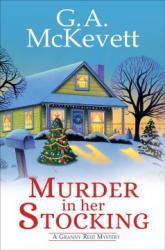
Stella Reid takes herself back to what she considers her best Christmas ever.
Stella had enough to deal with during the Christmas festivities, especially
with the recent vandalism of the McGill nativity display. Then late one
night, she discovers Priscilla Hart, the town bad girl, dying in an alleyway,
and it's clear she didn't go down without a fight. As a way of paying her
respect, Stella begins to investigate Priscilla's murder when almost everyone
around her seems to turn a blind eye, all while trying to ensure that she can
see her family during the holiday season. As the pieces of the puzzle come
together, Stella begins to realize who the culprit is-a culprit who even
thinking of the possibility of them committing murder breaks her heart.
G.A. McKevett released two books in 2018; this one and Hide and Sneak, the
next entry in her Savannah Reid mysteries. Out of the two books, this one is
what I feel is the better quality. It does a much better job of showing over
telling than Hide and Sneak, especially with Stella's grandkids. With both
the mystery itself and the subplot with Stella's family, this story does an
amazing job of being real, with just the right balance of heartwarming and
heartbreaking events to keep up that image. However, this story is not
without its flaws. As much as I loved how the culprit threw plot armor out
the window, I just felt like it came out of nowhere. I expected the culprit
to be at least somewhat linked to the evidence we saw, but I just felt who it
actually was was a failed attempt to mush two plotlines together. Altogether,
I was disappointed by the climax, especially with all the amazing buildup to
it earlier on. But hey, maybe my brain was just foggy from bacon withdrawal.
Overall, I highly recommend this mystery novel with every fiber of my
existence.
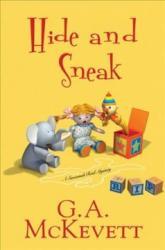
The Moonlight Magnolia Detective Agency has a new case that takes them up in
the world to famous actor Ethan Malloy. His wife and child have gone missing,
and he's counting on Savannah and the rest of the agency to return them safe
and sound. The case is already a dire one, but when the family's nanny is
found murdered near a forest trail, the situation becomes even more severe.
Savannah is rushing both to find Ethan's family and catch the nanny's killer
before another victim is claimed. With paparazzi swarming at every turn and
evidence that leads to more dead ends than not, this is shaping up to be
Savannah's deadliest chase yet. Will she be able to apprehend the culprit
before the final seconds of the clock tick down?
G.A. McKevett released two novels in 2018; this one and the first novel in a
spinoff series. While I personally find this book to be the one of lesser
quality, it's not by much at all. The mystery is handled in a phenomenal
light, and I was off my seat with anticipation of what would come next. It
all ended with a culprit I didn't expect, but was obvious in hindsight, which
I feel is a clever way to go about a culprit in a mystery. The side plot with
Tammy's parents was also handled really well. However, the reason I feel like
this was the lesser novel is because I felt like it often relied too much on
exposition to drive the mystery forward, which kind of beats the storytelling
purpose of "show, don't tell". However, I still consider this one of G.A.
McKevett's best works to date, and I absolutely recommend it to anyone and
everyone.
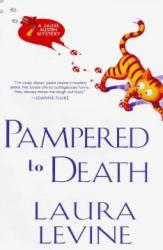
Jaine Austen is relieved to receive a gift trip to the Haven, a luxury resort
along the California coast, from her flamboyantly gay neighbor Lance.
However, upon arriving there, she realizes that the Haven is a fat
farm in disguise run by Olga, the Diet Nazi (her words and not mine). She's
sharing her "luxury vacation" with Mallory Francis, a famous movie star, and
her staff. While gracing the big screens is Mallory's job, her true calling seems to
be making enemies with everyone she comes across. So when Mallory is found
strangled by a piece of kelp during a seaweed wrap, the suspect list is
longer than Rapunzel's hair with added extensions. Not wanting to spend any
longer in Diet Hell than necessary (and yes, she does call the Haven that),
Jaine puts on her detective slippers once again to catch a culprit once
again. However, this will prove to be Jaine's most challenging cases yet, and
her chase to catch the culprit will put her life on the line more than ever
before.
Let me just get this off my chest. I-love-this series! It's so well-written,
and never ceases to amuse me. I love how this series waits until later than
most for the murder to happen,making the reader make assumptions on who the
culprit is before the murder takes place. However, every book I've read from
this series so far has a major flaw. While the actual investigation for each
book is individually unique, the main climax always follows the same format.
It goes as follows:
1) Jaine is left with no clear culprit until she remembers a piece of
evidence she missed
2) The person who seems like the furthest thing from the culprit is always
the culprit
3) Just as Jaine finds the culprit, they try to kill her
4) Something saves Jaine last-minute
5) The culprit is arrested
This book is no different. I really wish Laura Levine would break away from
this format, as it makes the series very repetitive. However, I just hope she
does it in future mysteries. But overall, I'd highly recommend this mystery,
especially for a good laugh. The mystery kept me guessing while still keeping
me relaxed, Jaine Austen is the most relatable protagonist ever, the sub-plot
with her parents is hilarious in an "I really shouldn't be laughing at this"
kind of way, and Prozac is-well, Prozac! Just make sure to have something to
strangle with (noose, execution chain, chimichanga, whatever suits you),
because I assure you that no Jaine Austen mystery has made me want to
strangle Lance more than this one by the end. You have been warned.
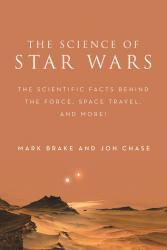
The Science of Star Wars by Mark Brake and John Chase is a fantastic read!
Explaining the science behind Star Wars the movie series through
understandable language and with humorous tone, the authors explore the
possibilities of realizing some of the fantasies of the galaxy far, far,
away. They also explain why some concepts in Star Wars will never be possible
in our own home. This book is appropriate for readers 16 and up. As a Star
Wars and science fan myself, I would definitely recommend this book.
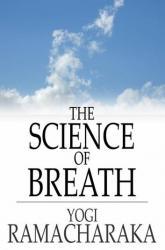
In the Science of Breath, by author Yogi Ramacharaka teaches about
deep breathing. He teaches of the incredible scientifically-proven benefits
to health, spirit, and mind through this simple act of something we already
need to survive—breathing. Captivating and engaging, this book grips
readers and equips them with knowledge to improve their moods, health, and
life. This book is appropriate for ages 14 and up. Anyone with an interest in
lowering stress, or simply with an interest in the science of breath, would
enjoy this book.
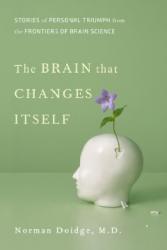
Dr. Norman Doidge’s book, The Brain That Changes Itself, introduces
the revolutionary new science of neuroplasticity. The brain and its ability
to change itself and re-wire is the core of Dr. Doidge’s research, a
research which carries fundamental repercussions for day-to-day life for
every human being on the planet. Inspiring stories of stroke victims learning
to speak again and other incredible tales of brain change bring a sense of
awe to the reader. Teaching us about this amazing new frontier in science,
this book is certainly a fascinating read. In my own experience,
neuroplasticity helps me create a better life for myself through lower stress
and brain re-wiring. I would recommend this book to readers ages 16 and up.
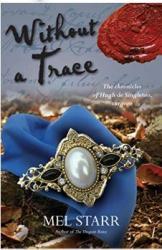
This medieval surgeon/bailiff is back for another adventure in the 12th book of this series. Hugh de Singleton is called upon to use his sleuthing skills to locate a missing noblewoman and her maidservant who disappear "without a trace" while traveling in the company of others in a caravan. Hugh is stumped at every turn as no clues turn up in his investigation. Will this mystery be the one he cannot solve?
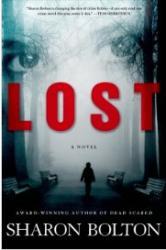
Wonderful mystery thriller with a lot of twists. The author gives this book a English/Brittish flair.
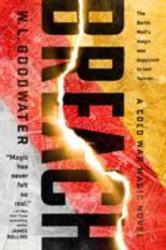
***THIS BOOK WAS RECEIVED FROM THE PUBLISHER***
It’s always interesting to see an alternate take on history where fantastical elements can help explain some mostly banal events and activities. In Breach, the reader is offered a glimpse into the top-secret realm of magicians in military espionage. Most of my knowledge of Cold War Berlin is based on pop culture representations, so there wasn’t anything too out of the ordinary here that would scream of historical inaccuracies. If anything, Breach almost felt like it could have been an extension of the Harry Potter/Fantastic Beasts franchise with how well it integrated history and magic.
While there was perhaps a bit too much browbeating over women’s role in society during the Cold War, the pacing, twists, and characters were excellent. It was a little difficult to tell the timeframe of this book, but I assumed it was probably in an alternate 1950s, based on the context clues. Of course, with the pacing of a modern thriller, Breach seems to get away with fully explaining the details of many of its characters’ motivations. I was sucked into the story enough that I didn’t care too much, but it was a nagging that gnawed at the back of my mind as I read.
For a first book, author W.L. Goodwater certainly put forth an admirable effort. The way plot points are set up and revealed was very entertaining, even if some of the finer points of the plot seemed to be repetitive to make sure the reader understood them. There was a lot of thought put into the magic system in this book without spending tons of time in exposition going over how it works, which I appreciate. There was also some solid character growth for both major and minor characters throughout this book, which is yet another reason why I think people should read this book.
A thrilling alternate history fantasy adventure, I give Breach 4.0 stars out of 5.
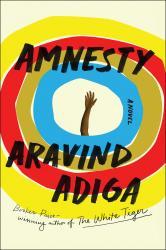
Danny is an undocumented immigrant from Sri Lanka living in Australia. As he's undocumented, he works as a cleaner and gets paid under the table. One day, he is contacted by the police as one of his clients had been murdered. Danny realizes that he likely knows who the murderer is, but has to decide whether or not to share that information with the police. If he does talk to the police, his undocumented status will likely be discovered and he would likely be deported.
This book spans one day in Danny's life, but flashes back to show you how and why he ended up as an undocumented person in Australia. And wow, that's a hard, scary life. The book both calls attention to the unfair, and frankly quite Draconian, immigration policies of Australia and presents a really interesting ethical dilemma. The central question of the book is kind of "what do we owe to each other"? Does Danny have a responsibility to turn in the murderer, even if it means his own life will be irreparably changed for the worse? Danny grapples with this question for much of the book, and it's a really interesting thought experiment. Really, my only complaint is that the last third or so of the book is really repetitive; I found the first two thirds to be fairly riveting.
Folks who are interested in ethics or who are interested in the hardships of the immigrant experience should definitely pick this book up. 3.5 stars. I really liked the first 2/3.
Thanks to Scribner and Netgalley for the eARC which I received in exchance for an unbiased review. Amnesty is available now.
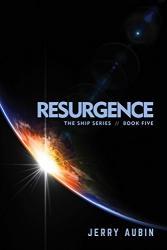
Jerry Aubin finishes the Ship Series in spectacular fashion. In Resurgence, Aubin ties up the series beautifully and answers all of the questions that have kept readers fascinated from the very beginning. Zax must finally face what he started and defeat the true enemy of the ship, Alpha. Resurgence will keep you on your toes with its whirlwind plot that will captivate you from the start. Like all of its predecessors, Resurgence does not disappoint with its plot twists and adventures. I highly recommend this book for any middle or high school aged reader.
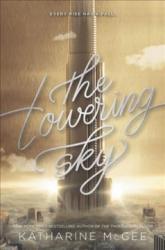
"The Towering Sky" by Katherine McGee tells the story of five teenagers in 2119. Living in a futuristic Manhattan tower in which your floor displays your power, a mystery/romance story is bred. This book was perfectly okay. The writing wasn't half bad, and the characters ,well half-baked, were not unrealistic or arrogant. However, as reading this book, the third and final of a series, without reading the first two, was extremely confusing. At first I had not realized that this book was part of a trilogy, and thought the writing was purposefully confusing. Though I don't know if this book would make more sense after reading the first two, the pacing was quite fast, though the plot moved slow, which created a strange vibe while reading. In general, I would not recommend this book. However, if you have read the first two and liked them, go ahead and give it a go.
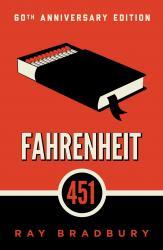
Fahrenheit 451 follows the story of a fireman, Guy Montag, who lives in a dystopian society. His job as a fireman is to locate all books around the city and burn them. Books are banned from any individual and is considered to be an inferior type of entertainment in comparison television, which are more supported by the public. As Montag continues to burn more books throughout his job over time, he deals with a variety of external factors that changes his brainwashed and disillusioned perspective to considering books and their significance to society. Being a firemen in this dystopian society, Montag must deal with a plethora of barriers that are blocking his way before he can truly understand the importance of books and to keep them.
Fahrenheit 451 is an intriguing book that takes a different approach in a dystopian society. Instead of implementing a militaristic and governmental style, Bradbury uses firemen which encapsulates a unique and captivating plot line. Fahrenheit 451 demonstrates a story that everyone can enjoy, especially for those who enjoy reading dystopian novels. Bradbury effectively relates character development of Montag to the series of events that occurs. This coherent relationship that virtually happens side-by-side further produces a sense of immersion for the reader.
Personally, I enjoyed Bradbury's Fahrenheit 451 novel. It is considered to be one of his best, and most iconic books that he has written to date. I highly recommend any average reader to consider reading Fahrenheit 451. The book is not too long, but it will still produce an immense amount of quality and satisfaction in the end.
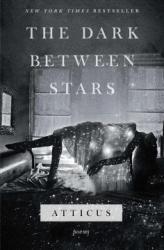
“The Dark Between Stars” is a hearthrobing book of poetry filled with the contrasting stories of the hope and despair that come with the human experience. The author Atticus, transports his readers back to their own memories, feelings, and emotions with his very relatable and beautifully written poetry. On each page I could see a different image or feel a different emotion which I think is the remarkable thing about the book. My favorite poem from the book was “The problem with falling in love is that everything else in life becomes boring by comparison”. I would highly recommend this book to any poetry lover, I have never before been so transported into my own thoughts and feelings while reading before.
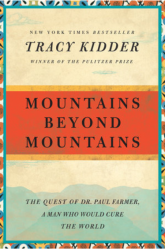
Mountains Beyond Mountains is a phenomenal biography detailing the work of Dr. Paul Farmer in Haiti and Boston. Kidder follows Farmer's story between his life in Boston, Haiti, and France, the constant travelling to see his patients in the former and his family in France. The story of Dr.Farmer is incredibly inspiring and eye-opening as it discusses the lack of health care in many places and the need for conscious implementation of medical programs in underdeveloped countries. Not only does Kidder follow Farmer to his hospitals, home visits, etc. but he follows him as Farmer changes medical institutions across the world. This is an amazing read and I highly suggest it to anybody interested in the medical field, the developing versus the developed world, or somebody just wanting an interesting story.


